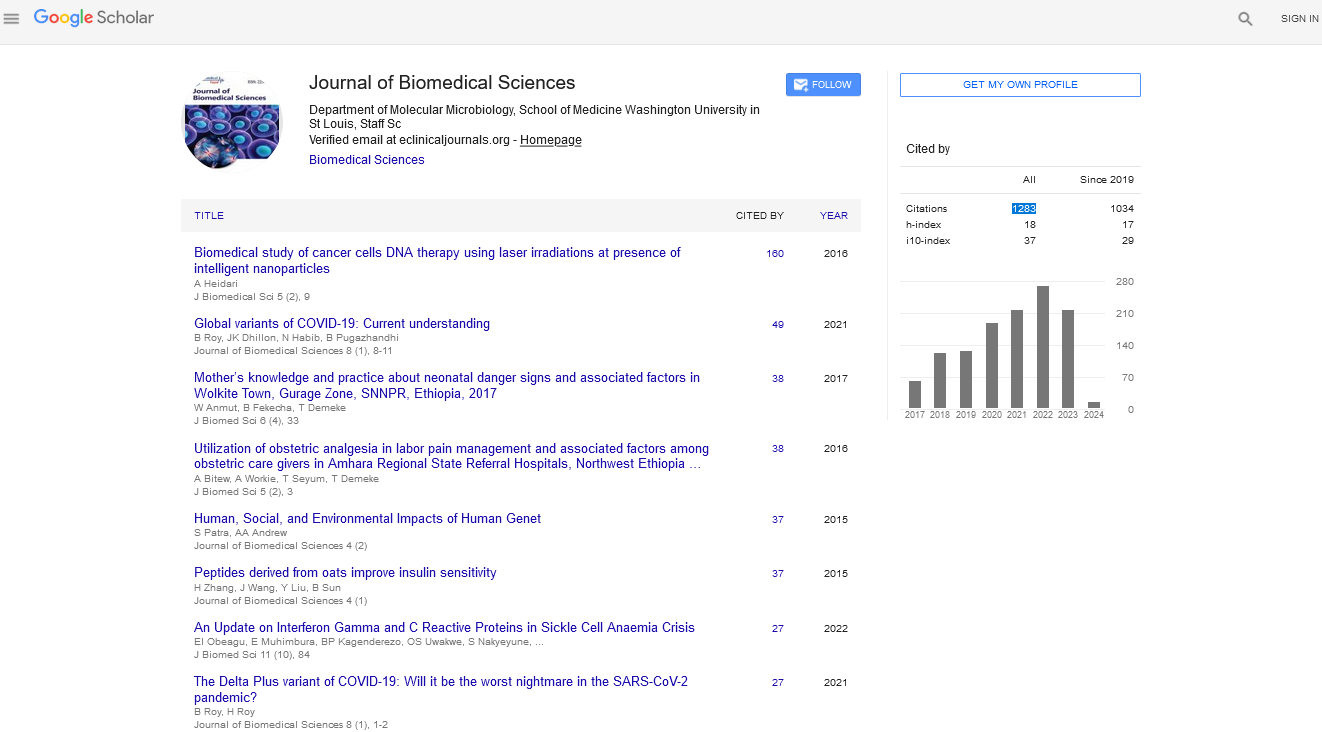Commentary - (2023) Volume 12, Issue 6
Cancer pharmacology: Unraveling the complexity for targeted therapies
Dinesh Kaia*
Department of Pharmacology, Andhra University, Visakhapatnam, India
*Correspondence:
Dinesh Kaia, Department of Pharmacology, Andhra University, Visakhapatnam,
India,
Email:
Received: 06-Nov-2023, Manuscript No. ipjbs-23-14330;
Editor assigned: 08-Nov-2023, Pre QC No. P-14330;
Reviewed: 22-Nov-2023, QC No. Q-14330;
Revised: 06-Dec-2023, Manuscript No. R-14330;
Published:
15-Dec-2023
Description
Cancer, a diverse group of diseases characterized by uncontrolled cell growth, remains a formidable challenge in medicine. Over the years, significant strides have been made in understanding the molecular intricacies underlying cancer development and progression. Cancer pharmacology refers to the branch of pharmacology that focuses specifically on understanding and managing cancer through the study of drugs and their interactions with biological systems. It encompasses a wide range of topics related to the development, testing, and application of medications for the treatment of cancer.
The landscape of cancer
Cancer is not a single entity but a multitude of diseases, each with unique genetic, molecular, and cellular features. The heterogeneity of cancer poses a considerable challenge, necessitating a personalized approach to treatment. Cancer pharmacology delves into the intricate details of these differences, aiming to identify specific vulnerabilities that can be exploited for therapeutic benefit.
Hallmarks of cancer and therapeutic targets
Understanding the hallmarks of cancer, as proposed by researchers Douglas Hanahan and Robert Weinberg, provides a framework for cancer pharmacology. These hallmarks include sustaining proliferative signaling, evading growth suppressors, resisting cell death, enabling replicative immortality, inducing angiogenesis, and activating invasion and metastasis. Each hallmark represents a potential target for therapeutic intervention.
Targeted therapies
Traditional cancer treatments, such as chemotherapy and radiation, have been crucial in cancer management, but they often lack specificity and can cause significant collateral damage to healthy tissues. Targeted therapies, a hallmark of cancer pharmacology, focus on specific molecules or pathways involved in cancer progression. This precision approach aims to disrupt cancer cells while sparing normal cells, minimizing adverse effects.
Molecular targets
Tyrosine kinases: Targeting tyrosine kinases, enzymes that regulate cell growth and division, has been a key strategy. Tyrosine Kinase Inhibitors (TKIs), such as imatinib for chronic myeloid leukemia, have demonstrated remarkable success.
Hormone receptors: Hormone-dependent cancers, like breast and prostate cancers, can be treated by modulating hormone receptors. For instance, tamoxifen acts as an estrogen receptor modulator in breast cancer.
Immune checkpoints: Immunotherapy, a breakthrough in cancer treatment, involves targeting immune checkpoints like PD-1 and CTLA-4. Checkpoint inhibitors unleash the body's immune system to recognize and destroy cancer cells.
Genomic and proteomic approaches
Biomarker identification: Cancer pharmacology relies on genomic and proteomic analyses to identify biomarkers-indicators of disease or treatment response. Biomarkers guide treatment decisions, allowing for a more personalized and effective approach.
Next-Generation Sequencing (NGS): NGS technologies enable the comprehensive analysis of cancer genomes, revealing mutations, copy number alterations, and other genetic changes. This information informs targeted therapy selection.
Resistance mechanisms
Despite initial successes, cancer cells often develop resistance to targeted therapies. Cancer pharmacologists investigate the mechanisms underlying this resistance, aiming to overcome or prevent it.
Adaptive changes in signaling pathways, genetic mutations, and tumor heterogeneity contribute to resistance. Combating resistance requires a deep understanding of the dynamic nature of cancer.
Combination therapies
Recognizing the complexity of cancer, combination therapies have emerged as a strategy to address multiple targets simultaneously. This approach aims to enhance treatment efficacy and reduce the likelihood of resistance.
Combinations of targeted therapies, immunotherapies, and traditional treatments are being explored in various cancer types.
Immunotherapy revolution
Cancer immunotherapy, a revolutionary approach in cancer pharmacology, harnesses the body's immune system to recognize and eliminate cancer cells.
Immune checkpoint inhibitors, Chimeric Antigen Receptor (CAR) T-cell therapy, and cancer vaccines are transforming the landscape of cancer treatment.
Chemotherapy
While cancer pharmacology extends beyond chemotherapy, it also includes the study of traditional chemotherapy agents. These drugs aim to kill rapidly dividing cells, including cancer cells, but they can also affect normal cells, leading to side effects.
Personalized medicine
Advances in cancer pharmacology have paved the way for personalized medicine, tailoring treatment based on an individual's genetic makeup, tumor characteristics, and overall health.
Molecular profiling guides treatment decisions, optimizing therapeutic outcomes and minimizing adverse effects.
Challenges and future directions
Despite significant progress, challenges persist in cancer pharmacology. Tumor heterogeneity, treatment resistance, and potential toxicities are ongoing concerns.
Future directions involve exploring novel targets, advancing technologies for early detection, and refining personalized treatment approaches.
Ethical considerations
Cancer pharmacology raises ethical considerations related to patient consent, access to innovative therapies, and the implications of genetic testing.
Balancing the promise of cutting-edge treatments with ethical principles is essential for responsible and equitable cancer care.
Resistance mechanisms
Researchers in cancer pharmacology investigate why some cancers become resistant to certain treatments over time. Understanding resistance mechanisms is vital for developing strategies to overcome or prevent resistance and improve long-term treatment outcomes.
Clinical trials
Cancer pharmacologists design and conduct clinical trials to test the safety and efficacy of new cancer treatments. These trials help bring innovative therapies from the laboratory to the clinic, ultimately benefiting patients.
Global impact
Cancer pharmacology has a global impact, influencing cancer research, treatment guidelines, and healthcare policies worldwide.
Collaboration between researchers, clinicians, and pharmaceutical industries is essential for addressing the global burden of cancer.
In conclusion, cancer pharmacology stands at the forefront of the battle against cancer, unraveling its complexities and guiding the development of targeted therapies. From understanding molecular targets to exploring combination therapies and embracing immunotherapy, the field continues to evolve. As we navigate the challenges and ethical considerations, cancer pharmacology remains a beacon of hope, promising more effective and personalized treatments for individuals facing this formidable disease. The ultimate goal is to improve outcomes for cancer patients and contribute to our broader understanding of the disease.





